RECNAニューズレター Vol.6 No.3 (2017年12月31日発行)
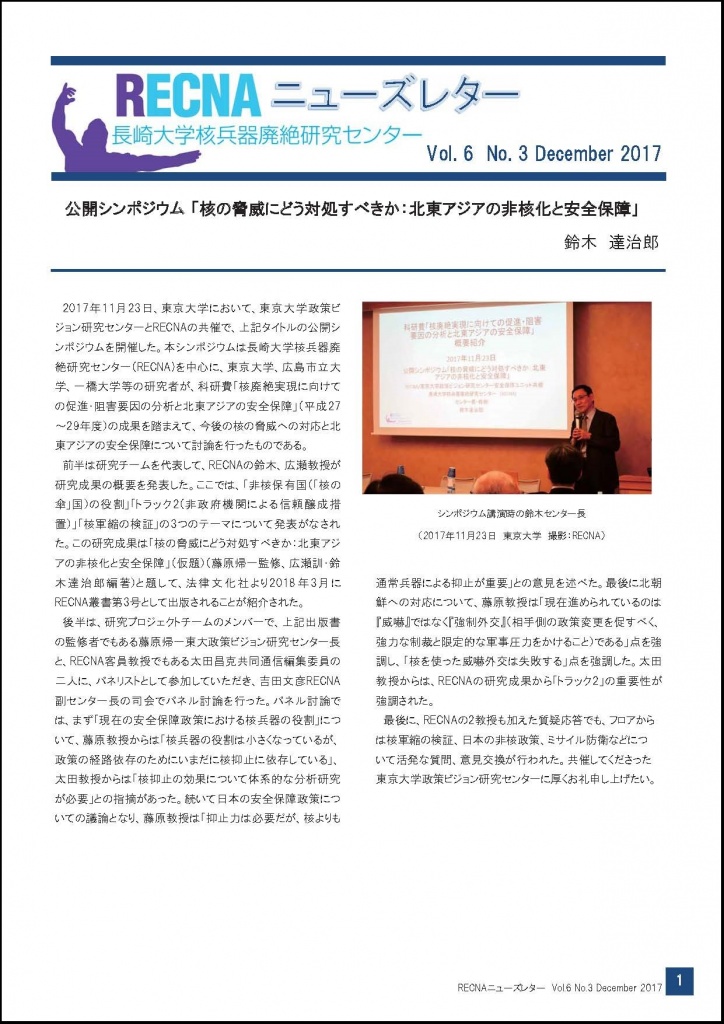 |
―― | ―― |
公開シンポジウム 「核の脅威にどう対処すべきか:北東アジアの非核化と安全保障」 |
新着情報What’s New
 |
―― | ―― |
公開シンポジウム 「核の脅威にどう対処すべきか:北東アジアの非核化と安全保障」 |
| 日時: | 2017年12月16日(土)13:30~15:30 |
| 場所: | 国立長崎原爆死没者追悼平和祈念館 交流ラウンジ |
| 講師: | 桐谷 多恵子 (RECNA客員研究員) |
| 主催: | 核兵器廃絶長崎連絡協議会(PCU-NC) |
| 共催: | 長崎大学核兵器廃絶研究センター(RECNA) |
| 講演をする桐谷氏 | 会場のようす |
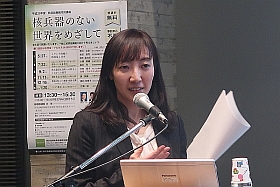 |
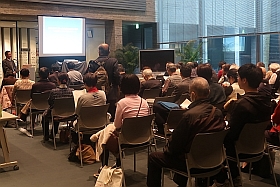 |
平成29年度核兵器廃絶市民講座「核兵器のない世界を目指して」の第5回目が12月16日(土)に国立長崎原爆死没者追悼平和祈念館交流ラウンジにて行われました。「戦後長崎における被爆の痕跡と復興-1940年代、50年代を中心に-」と題し、長崎大学核兵器廃絶研究センターの桐谷多恵子客員研究員が講師を務めました。
まず冒頭で、長崎で被爆した祖母の存在が研究者を目指した原点であること触れ、無名な人にも名前と人生があり、それらも歴史を作っていると語りました。自らの研究対象である1940年代後半~50年代の広島・長崎における市民目線での復興について、ここでは両都市の復興を地理的視点も交えながら説明しました。
最後に被爆体験の継承について述べ、被爆体験のない世代が新たな語り手となるには、人間的悲惨を自分事として向き合う努力が必要だと強調しました。これからの課題「継承」を繋げていく力がいかに大切を実感しました。
講座には約70名の市民が集まり、復興とは何か、被爆体験の継承をどうやってすべきかを考える有意義な時間となりました。
講演後には「RECNAと語ろう」を行い、講演の内容やRECNAの今後について、RECNA教員と参加された市民・学生による熱い思いの意見交換が行われました。
※本講演会の内容は講演者及び対談者個人の意見を表すものであり、主催団体及び共催団体等の見解を示すものではありません。
| 日時: | 2017年11月11日(土)13:30~15:30 |
| 場所: | 国立長崎原爆死没者追悼平和祈念館 交流ラウンジ |
| 講師: | 孫 賢鎮 (広島市立大学平和研究所准教授) |
| 主催: | 核兵器廃絶長崎連絡協議会(PCU-NC) |
| 共催: | 長崎大学核兵器廃絶研究センター(RECNA) |
| 講演をする孫氏 | 会場のようす |
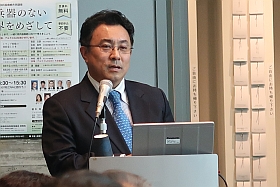 |
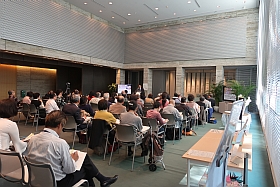 |
平成29年度核兵器廃絶市民講座「核兵器のない世界を目指して」の第4回目が11月11日(土)に国立長崎原爆死没者追悼平和祈念館交流ラウンジにて行われました。「朝鮮半島の非核化―その現状と展望」と題し、孫賢鎮氏(広島市立大学平和研究所準教授)が講師を務めました。
まず冒頭で、孫氏が韓国統一省で北朝鮮の人権問題や法律に関連する仕事に従事していたころの自身の体験に基づき、間近で見てきた北朝鮮の情勢について以前よりは安定しているとし、その理由として「スイスでの経験なども踏まえて経済や民主主義に理解のある金正恩政権となったからであろう」と述べました。
また1980年代からの朝鮮半島核問題の30年間を振り返り、非核化にむけて6者協議が始まったものの、北朝鮮の核兵器の廃棄をうたうアメリカ、韓国、ロシア、北朝鮮の安定を最重視する中国、拉致問題の解決を要求する日本の、それぞれの立ち位置の微妙な違いについて語りました。そして北朝鮮の核開発の高度化は近い将来実現するであろうとし、朝鮮半島の非核化を目指すためには、まず核の傘下に入っている日本や韓国で、平和に向けて市民レベルの議論を行うことが重要であると結びました。
講座には約50名の市民が集まり、今後核兵器廃絶に向けてさらに市民団体、市民レベルで共に行動を継続させていくことの大切さを考える時間となりました。
講演後には「RECNAと語ろう」を行い、講演の内容やRECNAの今後について、RECNA教員と参加された市民・学生による活発な意見交換が行われました。
※本講演会の内容は講演者及び対談者個人の意見を表すものであり、主催団体及び共催団体等の見解を示すものではありません。
| 日時: | 2017年11月23日(木)13:30~16:30 |
| 場所: | 東京大学伊藤国際学術研究センター中教室 |
| 主催: | 長崎大学核兵器廃絶研究センター(RECNA) |
| 共催: | 東京大学政策ビジョン研究センター安全保障ユニット |
| 科研費結果発表を行う鈴木センター長 | パネル討論の光景 |
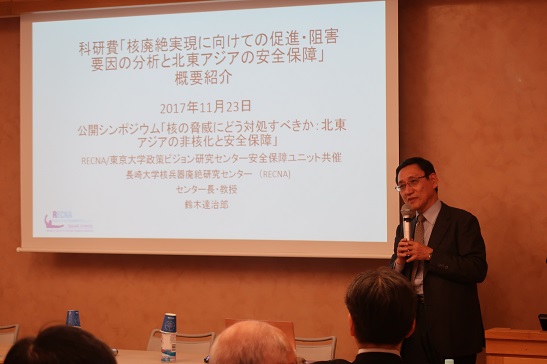 |
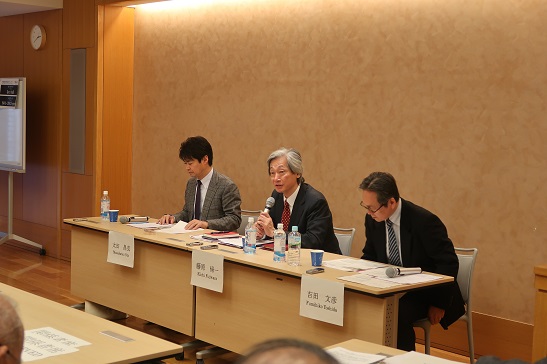 |
右から順に 吉田文彦 RECNA副センター長 藤原帰一 東大政策ビジョン研究センター長 太田昌克 共同通信社編集委員 |
11月23日(木)に公開シンポジウム 「核の脅威にどう対処すべきか:北東アジアの非核化と安全保障」が東京大学伊藤国際学術研究センター中教室にて行われ、約60名もの方々が集まりました。
本シンポジウムは長崎大学核兵器廃絶研究センター(RECNA)を中心に、東京大学、広島市立大学、一橋大学等の研究者が、科研費「核廃絶実現に向けての促進・阻害要因の分析と北東アジアの安全保障」(平成27~29年度)の成果を踏まえて、今後の核の脅威への対応と北東アジアの安全保障について討論を行ったものです。
前半は研究チームを代表して、RECNAの鈴木達治郎センター長、広瀬訓副センター長が、研究成果の概要を発表しました。また、研究成果は2018年3月に「核の脅威にどう対処すべきか:北東アジアの非核化と安全保障」(仮題)(藤原帰一監修、広瀬訓・鈴木達治郎編著)として法律と文化社より出版されることが紹介されました。
後半は、研究プロジェクトチームのメンバーで、上記出版書の監修者でもある藤原帰一東大政策ビジョン研究センター長と、RECNA客員教授でもある太田昌克共同通信編集委員のお二人に、パネリストとして参加していただき、吉田文彦RECNA副センター長の司会でパネル討論を行いました。パネル討論では、まず「現在の安全保障政策における核兵器の役割」について、藤原教授からは「核兵器の役割は小さくなっているが、政策の経路依存のためにいまだに核抑止に依存している」、太田教授からは「核抑止の効果について体系的な分析研究が必要」との指摘がありました。続いて日本の安全保障政策についての議論となり、藤原教授は「抑止力は必要だが、核よりも通常兵器による抑止が重要」との意見を述べられました。最後に北朝鮮への対応について、藤原教授は「現在進められているのは『威嚇』ではなく『強制外交』(相手側の政策変更を促すべく、強力な制裁と限定的な軍事圧力をかけること)である」点を強調し、「核を使った威嚇外交は失敗する」点を強調されました。太田教授からは、RECNAの研究成果から「トラック2」の重要性を強調されました。
最後に、RECNAの2教授も加えた質疑応答でも、フロアーからは核軍縮の検証、日本の非核政策、ミサイル防衛などについて活発な質問、意見交換が行われました。
| 会場の様子 |
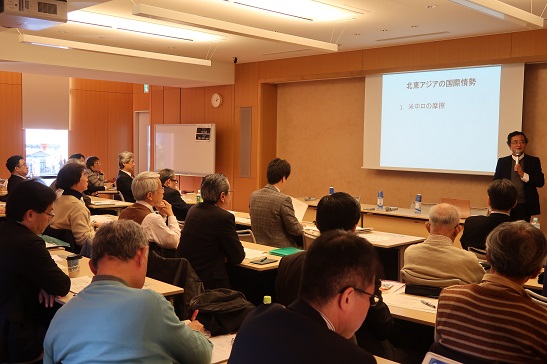 |
<講演動画>
※本講演会の内容は講演者及び対談者個人の意見を表すものであり、主催団体及び共催団体等の見解を示すものではありません。